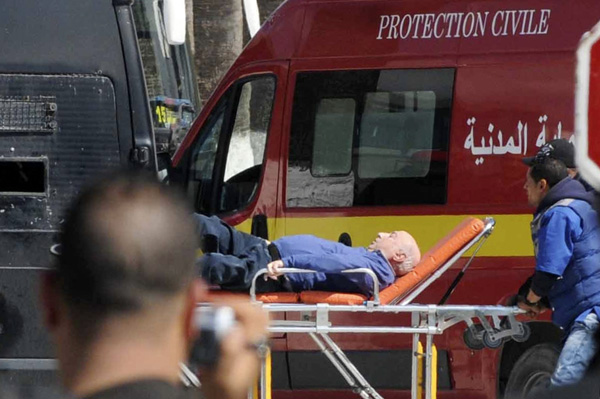Manhunt launched for accomplices in Tunisian museum attack
 |
|
A tourist injured after an attack by gunmen on Tunisia's national museum is wheeled on a stretcher in Tunis March 18, 2015. [Photo/Agencies] |
It was the worst attack in the country since an al-Qaida militant detonated a truck bomb in front of a historic synagogue on the Tunisia's island of Djerba in 2002, killing 21, mostly German tourists.
Tunisia has been more stable than other countries in the region, but has struggled with violence by Islamic extremists who have sworn allegiance to both al-Qaida and the Islamic State group.
A disproportionately large number of Tunisian recruits - some 3,000, according to government estimates - have joined Islamic State fighters in Syria and Iraq and many have received training in neighboring Libya.
The US Embassy in Tunis was attacked in September 2012, seriously damaging the embassy grounds and an adjoining American school. Four of the assailants were killed.
Overall, though, violence in Tunisia in recent years has been largely focused on security forces, not foreigners or tourist sites.
In October 2013, a young man blew himself up on a beach in the coastal town of Sousse after being chased from a hotel, causing many to expect a new wave of attacks on tourism. None materialized until now.
The United States, France, the United Arab Emirates and the United Nations denounced the bloodshed. US Secretary of State John Kerry said Washington "condemns in the strongest possible terms today's deadly terrorist attack" and praised Tunisia's "rapid response" to resolve the hostage situation and restore calm.
Speaking at the Louvre museum to call for international efforts to preserve the heritage of Iraq and Syria against extremist destruction, French President Francois Hollande said he had called Tunisia's president to offer support and solidarity.
- 'Not much time left' to adapt to new terror law
- Flight delayed due to terror threat hoax
- Top court vows strict penalties for terror attacks
- Xinjiang remains stable despite terror attacks: official
- Absurd blame for China's anti-terror bid
- US lawmakers 'fail to grasp China anti-terror law'
- US lawmakers 'fail to grasp China anti-terror law'





















